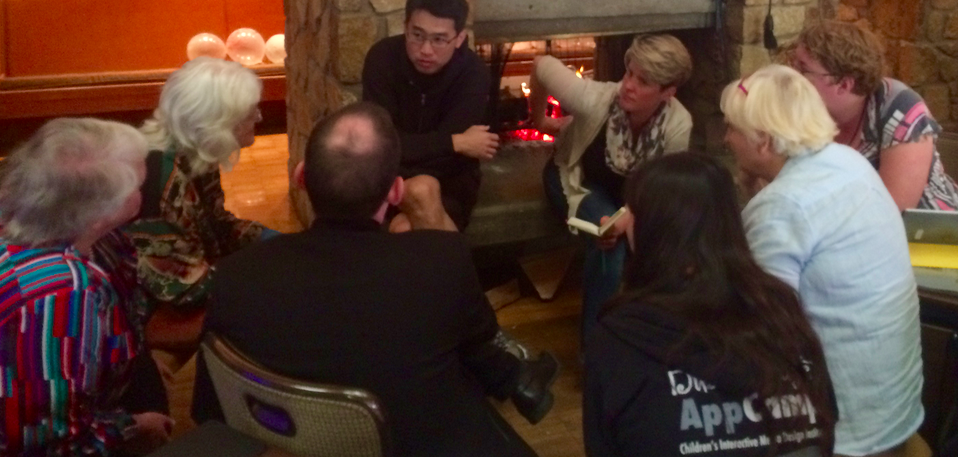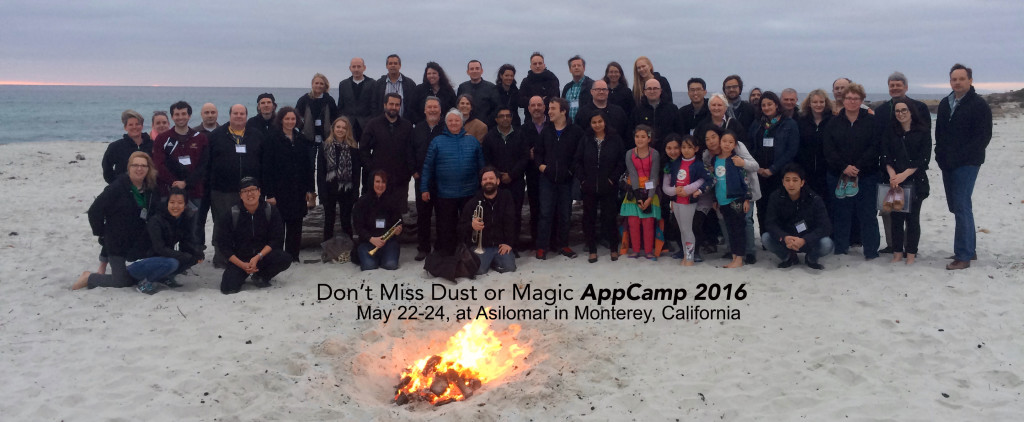AppCamp 2016 Agenda
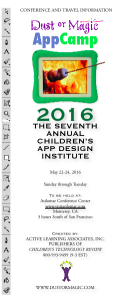 [highlight]Please note: This page has been archived.[/highlight]
[highlight]Please note: This page has been archived.[/highlight]
The 7th Annual Dust or Magic “AppCamp” on the Design of Children’s Apps has concluded as of May 24, 2016.
WHAT TO BRING: Relaxed, casual clothing (layers are best); arrive well-rested with charged gadgets.
DEMOS: If you plan on doing a 5 minute demo, read this for suggestions on format and feedback.
CHILDREN’S APPFEST IN SAN FRANCISCO: A low cost meeting for publishers who can’t afford AppCamp. The meeting will take place on Saturday May 21, 2016 at the Co.lab in San Francisco. Tickets are $12 each, free for registered Dust or Magic AppCamp attendees; children are welcome (no cost for kids). Learn more about the Children’s AppFest.
NO SELLING: As usual, Dust or Magic is self-funded with no affiliation with Apple, Google or sponsors. Participants turn off “selling” and turn on “sharing.” A promotional materials table is provided for flyers, white papers or business cards. This is a free exchange area; no more than 50 copies will be needed.
[highlight]Sunday May 22, 2016[/highlight]
1:00 Check in to your room (Phoebe Snow Social Hall)
3:00 Check in to Dust or Magic (Fred Farr Forum)
Find Barbara Chase to pick up your materials. It will contain your name tag, handouts and so on. Fred Farr Forum is Asilomar’s second biggest meeting space; locate in the wooded area of the Asilomar.
5:00 Essential Topics for 2016
We’ll set the stage for our next 36 hours together, so all the presenters can contextualize their talks. We’ll begin by naming the key trend setting apps; including lessons learned from the KAPi prize and the BolognaRagazzi Digital Award. These will include:
-
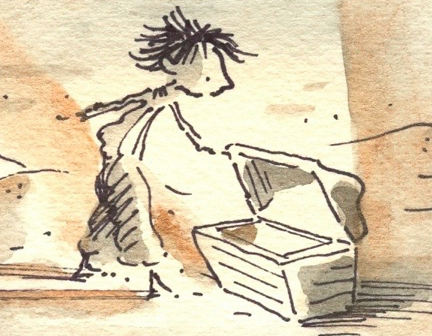
Art by Peter Reynolds Should you update a classic or make a new app from scratch? 2016 has been the year when some classics have been drastically improved. Is it better to remodel or start from scratch with something new? Dan Russell-Pinson (Stack the States 2) and Pierre Abel (Montessori Numbers) will let us know what they think.
- Who’s making money, and how? Small app studios known for high quality work are struggling or are being gobbled up by larger groups. What’s the best career path for a small, smart designer?
- VR and AR. The viewers are here and the platforms defined. What’s working? What are some common mistakes?
- Apple Watch, Pro and TV. OK, OK… the Apple Watch isn’t for kids. But the concept of a device on a wrist certainly is, and there are lessons to be learned by this technology. What types of apps are best suited to which screen size and/or device? Where will these platforms be in the next 12 months?
- Toys vs Apps. Reyne Rice will provide a 5 minute summary of the key trends from the world of toys.
- How to properly sell an app to a kid. Besides the paid, free, freemium, paymium, and subscription models, what’s the best technique to promote new content to a young audience?
- What does “Diversity in Apps” really mean? Who’s doing the best work and who needs to improve? How do you make an app balanced in terms of gender and ethnic content, without boiling out all the originality?
-
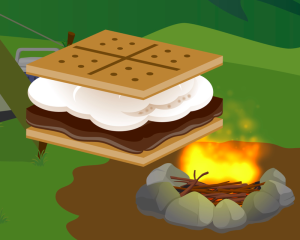
From Camping With Grandpa iOS 9.3/Education & Google Play news. Apple promises new features that will “make using iPad in schools easier and better for students and admins.” What are these features? How do you make them work? What’s new from Google Play?
- State of the “non-iOS.” Are kids leaving fingerprints on Fingerprint? Has there been any progress for kids from Windows, Amazon, Google Play, Chrome or any of the gaming platforms?
- Children’s App news. Nominations with discussion for Magic and Dust of 2016 — Unity and other essential tools, examples of innovation and excellence; biggest train wrecks — what went wrong, why and how to learn from other people’s mistakes.
- Hardware news. Larger tablets, wearables, watches and augmented reality (especially Oculus and Google cardboard). How interactive media is moving beyond the touch screen.
6:00 PM Dinner & Visit to the Pacific Beach
Welcome to AppCamp 7: A special place, a special time

8:00 Annual State of the Children’s App Panel (Fred Farr)
A review of 2016 with some of the best minds in the space. The 2016 “State of the Children’s App” Panel will include Pierre Abel, Björn Jefferey, Dan Russell-Pinson, Ariella Lehrer, Mark Schlichting, Valerie Touze, and Shazia Makhdumi.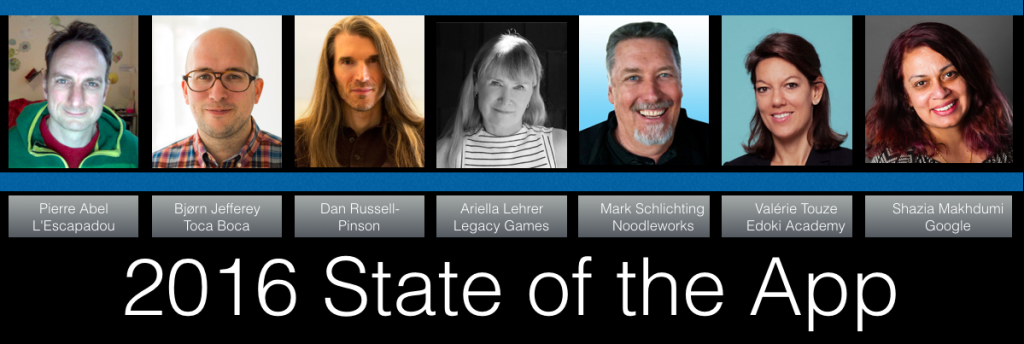
9:00 PM Dan Russell-Pinson. Enthusiasm + Knowledge = Success
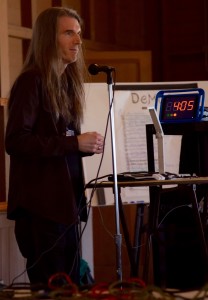 The creator of Stack the States, looks back on his 9 year run of making games and shares his philosophy on the process. This talk explores the personal traits that lead to success, how to define and achieve your goals and what qualities make a successful game. He’ll also discuss the pitfalls of the creative process as well as how to find the right mindset to overcome them.
The creator of Stack the States, looks back on his 9 year run of making games and shares his philosophy on the process. This talk explores the personal traits that lead to success, how to define and achieve your goals and what qualities make a successful game. He’ll also discuss the pitfalls of the creative process as well as how to find the right mindset to overcome them.
[Don’t miss this rare talk by a pioneer.]
[highlight]Monday May 23, 2016[/highlight]
7:00-8:15 am Breakfast Buffet (dining hall)
8:30 Child Development 101
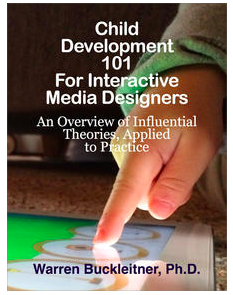 Magic: What lies at the heart of a “magical” engaging interactive media product? Child development theory. But don’t worry — this talk is short, sweet and to the point; and it’s based on the continually updated ibook Child Development 101 for the Designers of Children’s Interactive Media, by Warren Buckleitner (Dust or Magic participants get a free download code; and a hard copy is in your handout packet).
Magic: What lies at the heart of a “magical” engaging interactive media product? Child development theory. But don’t worry — this talk is short, sweet and to the point; and it’s based on the continually updated ibook Child Development 101 for the Designers of Children’s Interactive Media, by Warren Buckleitner (Dust or Magic participants get a free download code; and a hard copy is in your handout packet).
9:30 Designer Micro Jam
Small groups will work together to explore emerging opportunities and upcoming challenges, from ROI (Return on Investment) to improving a play pattern. With Daren Carstens and Barbara Chamberlin.
10:15 Nice Touch — 60 second demos. An informal exploration with show and tell of some of the latest HCI “best practice” applied to multi-touch settings for children (and adults).
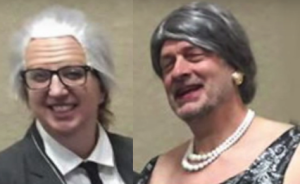 10:30 A Special Visit From Maria Montessori and BF Skinner, fresh from their panel at last year’s NAEYC. If you haven’t seen the famous video, here it is.
10:30 A Special Visit From Maria Montessori and BF Skinner, fresh from their panel at last year’s NAEYC. If you haven’t seen the famous video, here it is.
This year, we’re fortunate to have two of the four panel participants — BF Skinner and Maria Montessori at AppCamp. You’ll be able to hear their thoughts on an any particular app, ask them your favorite theoretical question or pose for a selfie.
1045: What would Montessori really say?
After Montessori and Skinner have departed, you can here what Montessori would really say, from a former Montessori teacher — Valerie Touze of Edoki Acadamy. She’ll share five apps that get Maria’s approval; and five that wouldn’t — and why.


11:30 Mark Schlichting: What I learned from Writing a Book about Interactive Design
“For many years, I’ve been working on a book on interactive design for children, and I’m coming to the end. Here are some important things that I’ve learned:
- How important applied learning theory is to creating great titles. (I started out totally on the intuitive side of the design, and now have vocabulary to describe it.)
- To spot the Dust quickly. For example, at one point I was looking for games that supported Nurturing play, and so looked at a lot of pet and people “doctor” apps, and the first thing many of them did was make a kid spell the animals name before they could do anything, and then when the kid got it right – the PROGRAM did the nurturing thing never letting the kid do anything!
- How quickly the market changes: I started writing at the time when CD-ROMs were in decline and the internet was still dial-up. Then we saw (it seemed like) hundreds of virtual worlds (where are they now?), then mobile (back to the small screen), then touch. What’s next?
- But most importantly, the core elements of good interactive design for children apply consistently to all the media, and hold up over time if done correctly.”
12:00 Lunch

1:00 App Case Study: Bringing Endless Learning Academy to the big screen, on Apple TV with Rex Ishibashi of Originator. A conversation (finally) with the publisher of Endless Learning Academy. We’ll see it demonstrated on Apple TV.
1:15 PM Q/A with Björn Jefferey

Few people connect the dots of the children’s app space better than the leader of Toca Boca. Come and find out what’s on his mind about the app market, the intersection of linear and interactive media, and learn how the Toca Socks have been selling. Homework: Watch Björn’s talk from last year, or this video from five years ago — Making a Magical Children’s App: The Toca Boca Approach
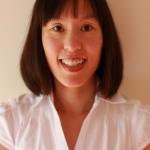
2:15 Content Curation & Designing for Classrooms. Lessons from the WonderBox by Caroline Hu Flexer of Duck Duck Moose.
“I’m share what we’ve learned about curating quality content, as well as building a platform for content delivery and communication.”
2:45 Demos
3:00 Kid Panel
A conversation with the real experts about what they think is “dust” and “magic.” All children are welcome to join.
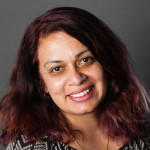
4:00 Family Friendly Apps on Google Play with Shazia Makhdumi, Google (Shazia is in charge of business development for educational apps and games for Google Play).
“Google Play launched Designed for families a year ago to help developers get apps and games to parents. I will share ideas on optimizing apps for families, and provide some of the latest updates on products and services available on Google Play.”
5:00 Case studies in dust and magic. We’ll discuss the “dust” and the “magic” of a few relevant examples from the past 12 months.
- How could you make Toca Dance into a six star app?
- Boum! by Les inedieurs
- Cosmic Watch by Celestial Dynamics
- CHOMP! by Christoph Niemann
- Who is Dr. Panda? Why do kids like him?
6:00-7:30 Dinner & Marshmallow Roast
7:40 Group photo (optional)
7:50 Marshmallow Roast, Beach
[highlight]Monday Evening[/highlight]
8:30 “Legends of Children’s Software,” hosted by Ann McCormick
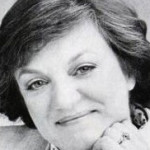
Once upon a time, when floppy disks flopped, companies like Brøderbund, Voyager, Davidson and The Learning Company were the Toca Bocas of the day.
There were other types of problems back then — like RAM & ROM, PCs vs Macs, SoundBlasters — not to mention that you had physically “burn” your code into spinning disk and ship it to your costumer in a “box” at “retail.” Walk down memory lane, and pick up some suggestions from old timers who have climbed the mountain before, and who know the view from the top. With Aleen Stein (Voyager), Mark Schlichting (Brøderbund) and others.
9:30 Discussion and demos
10-12 PM Free play
[divider]
[highlight]Tuesday, May 24, 2015[/highlight]
Room checkout by 10 AM.
7:00-8:15 am Breakfast (Dining Hall)
8:30 Critics Panel. Updated for 2016. An open invitation to published children’s app reviewers, to come and define what five stars looks like.
- How to submit products for review
- What do you do when you get a bad rating?
- Nice touches — Concrete examples of noteworthy design techniques.
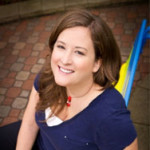
9:00 Measuring Learning: Techniques and Strategies by Tamara Kaldor of the TEC Center at the Erikson Institute.
“I think there are some great lessons around cues and materials developers can create to help teachers translate scores from apps into meaningful learning experiences. Parent engagement and empowering parents through data that makes sense is where we need to be headed. I’ll share the results of a recent TEC survey, and provide examples of apps that capture a child’s progress.”
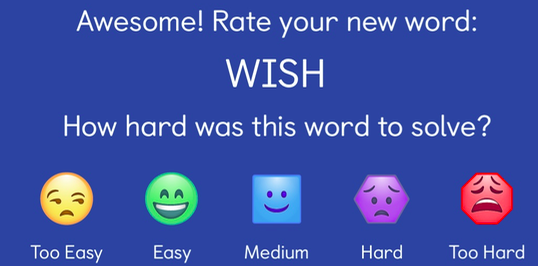
10:00 Dust or Magic TED-Style talks
1. Jeannine Herron: Teaching the Brain to Learn to Read.
2. Tico Ballagas: The research behind Kindoma.
11:00 Review
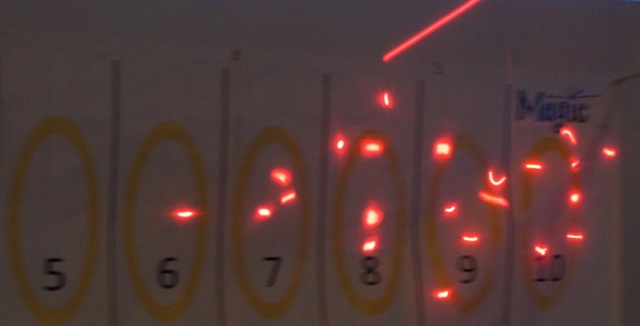 Let’s think back on the past 36 hours for the key lessons for the rest of 2016, and beyond.
Let’s think back on the past 36 hours for the key lessons for the rest of 2016, and beyond.
12:30 Lunch
1:30 Departure
Join the conversation! Visit the registration form.
[highlight]2016 AppCamp Speakers[/highlight]
[speakers presentation_id=4360/]

